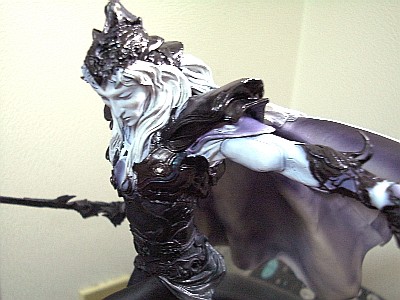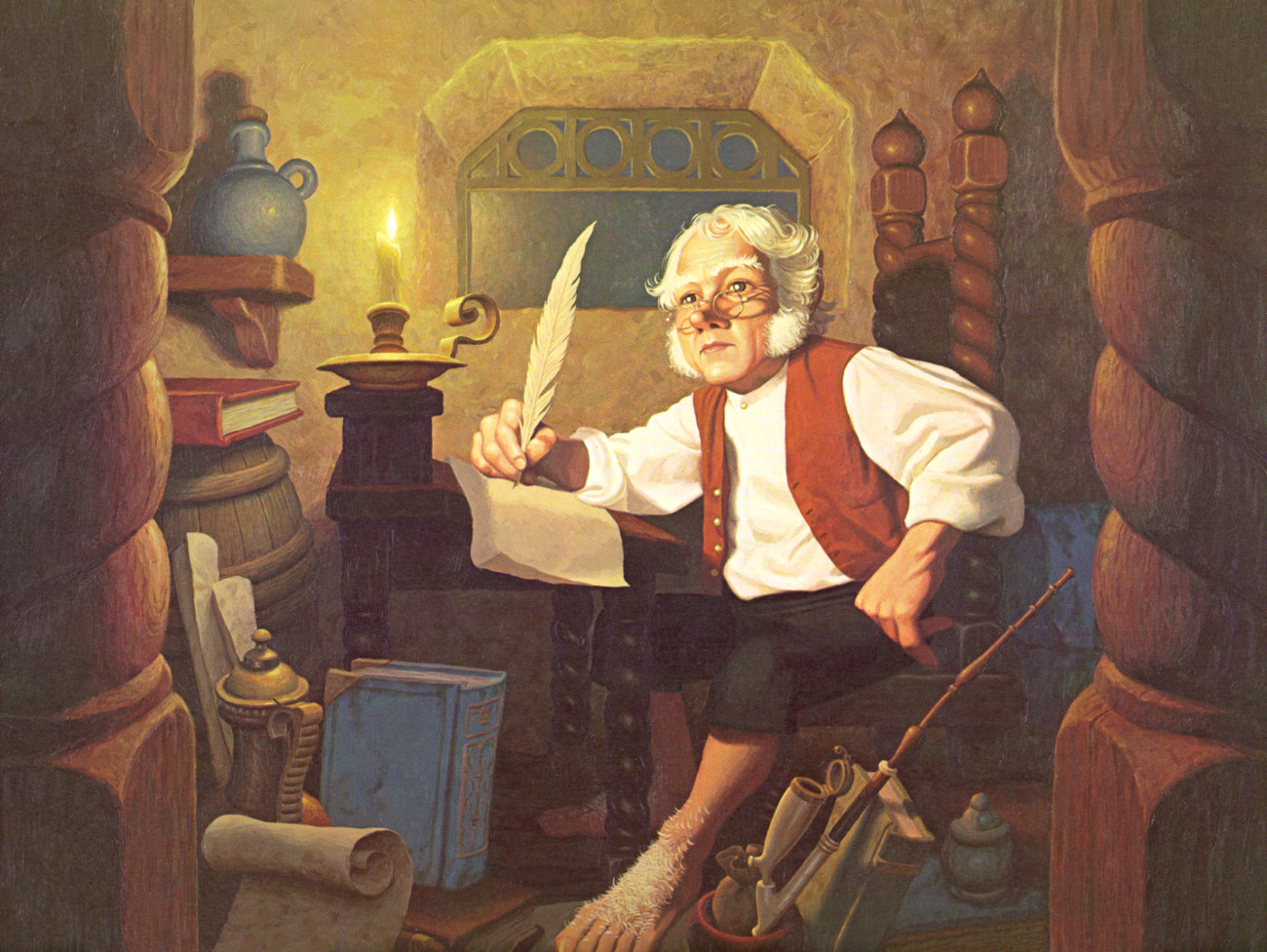The Noble
[D&D Core Class]
The Noble
Nobles represent the privileged upper class of civilized society – royalty, the wealthy, politicians, or the elite. Often borne into the lap of luxury, nobles are commonly raised with a sense of authority and entitlement and the freedom to indulge their whims. The nobles are well-versed in both art and war, in both the beauty of music and the glory of conquest. Nobles come in all shapes and sizes, from the benevolent, duty-bound protector to the indulgent, pampered fop to the cruel, tyrannical king.
Nobles are found among most civilized humanoid societies, particularly humans and elves. Gnome and dwarf nobles are not uncommon. Half-orc nobles? Don't be ridiculous.

Noble Prestige Classes: gentleman, professor.
Adaptation: The noble can serve as a PC alternative to the aristocrat NPC class.
Game Rule Information
Nobles (Nob) have the following game statistics.
Abilities: Charisma is of great value to the noble. Many class skills and class features depend upon the noble’s ability to influence. Often tutored in a wide variety of subjects and in the reading the motives of others, the noble greatly benefits from high Intelligence and Wisdom.
Base Attack Bonus: Average (as a cleric).
Hit Die: d8.
Saves: Good Will / Poor Fortitude and Reflex.
Class Skills: The noble's class skills are Appraise (Int), Bluff (Cha), Concentration (Con), Craft (Int), Diplomacy (Cha), Intimidate (Cha), Knowledge (History) (Int), Knowledge (Nobility and Royalty) (Int), Knowledge (Religion), Perform (Cha), Profession (Wis), Ride (Dex), Sense Motive (Wis), and Speak Language (Int). Skill Points at Each Level: 4 + Intelligence modifier (x4 at 1st level).
Alignment: Any nonchaotic. Nobles tend to be lawful, reflecting the social hierarchy in which they are raised. However, beginning at 2nd level, nobles can freely change their alignment to chaotic without hampering their ability to advance in the class.
Starting Age: As a bard.
Starting Gold: 6d4 x 10gp.
Favored Class: Like the aristocrat and barbarian (house rule), the noble is a "cultural class" defined by a specific upbringing. As such, characters can only take their 1st level of noble as 1st-level characters, but then may freely multiclass in and out of the class as they wish. Characters without this level of noble cannot later take levels of the class, although they may still attain stature and prestige – the "nuveau noble," a true noble might sniff.
Class Features
All of the following are class features of the noble.
Weapons and Armor Proficiency: Nobles are proficient with all armor and shields, all Simple weapons, and with the composite longbow, composite shortbow, longsword, and rapier.
Aristocracy
Unlike some mere commoner, the noble did not sprout fully-formed from the mud in rags and black teeth; he would have you know he is the product of a refined, cultured heritage and aristocratic upbringing. His continued ties with this elite community benefits him throughout his career.
The noble must designate a specific social circle or noble family as his Aristocracy, which can be a royal court, elite family, or upper class specific to a city or location. The noble’s standing with his Aristocracy determines his access to Inheritance [see Inheritance class feature] and can affect his ability to advance in this class. The noble starts his career in good standing with his Aristocracy, but his actions and forces beyond his control can damage this relationship in following ways:
Blueblooded
Despite its scarlet hue, the noble’s blood is royal blue. He receives the Blueblooded feat for free, gaining a +2 bonus on Knowledge (Nobility and Royalty) checks – which is always considered a class skill for him – and receiving 4x the normal starting gold (which is already computed into Starting Gold).
Cultured
By fortune or fate, life has granted the noble access to the finest resources and education. To better communicate with both allies and enemies, he receives two bonus languages of his choice (except secret languages such as druidic), and he may select three bonus class skills and/or weapon proficiencies of his choice, which typically reflect the nature of his upbringing.
If tutored by the court magician, for example, the noble might acquire Knowledge (Arcana), Spellcraft, and Use Magic Device as class skills and speak draconic and auran. If sworn to defend of the glory of the empire, he might be proficient in the battleaxe, greatsword, and heavy flail, and speak the languages of his dwarven allies and goblinoid enemies. Or if raised in a world of court intrigue and treachery, he might select Gather Information and Listen as class skills, proficiency in the hand crossbow, and speak two humanoid languages often spoken in the court.
Equestrian
He appreciates the pageantry that a fine steed affords, and avoids letting his feet touch the dirt and mud whenever possible. The noble gains Mounted Combat as a bonus feat and 1 bonus rank in the Ride skill.
Inheritance [1st/5th/10th/15th/20th level]
Access to wealth has obvious benefits. To assist him in his exploits and dealings with commoners and other dangers, the noble is bestowed Inheritances by his Aristocracy as long as he maintains his good standing [see Aristocracy class feature].
At 1st level, he is granted his choice of a masterwork version of any weapon in which he is proficient. At 5th level and every five levels thereafter, the noble is granted the single magical item of his choice, with the DM's approval, of a value no greater than 3,000gp x his noble level when granted.
Obey Your Better [2nd level]
The noble speaks with confidence and authority. A number of times per day equal to his Charisma modifier (minimum 1), he may issue a command (DC 10 + half of noble level + Charisma modifier). Outsiders, aristocrats, and those with the Blueblooded feat whose HD exceed the noble's are immune to this spell-like ability.
Metropolitan [3rd level]
He thrives in the bustle, color, and comforts of the city – but in the less sophisticated, dirtier corners of the world, he’s as out of place as a minotaur in a tutu. The noble receives a morale bonus or penalty to Diplomacy, Gather Information, and Intimidate checks made in urban environments depending on the size of the city in question. He gains a +4 bonus to such checks when in a metropolis, a +3 bonus in a large city, a +2 bonus in a small city, a +1 bonus in a large town, a –1 penalty in a village, a –2 penalty in a hamlet, and a –3 penalty in some horrid little thorp.
When in the city of his Aristocracy, however, the noble gains a minimum +2 bonus to such checks, regardless of the city’s size. In addition, when dealing with aristocrats, nobles, and creatures with the Blueblooded feat, he enjoys a minimum +1 bonus to such checks, regardless of the dreary location in which fate has cruelly stranded them. Metropolitan is extraordinary.
Tactician [4th level]
He is a tactical opponent, maximizing his strengths and exploiting weakness. The noble gains as a bonus one of the following feats for which he qualifies: Combat Expertise, Combat Reflexes, Feinting Expertise, Power Attack, or Ride-By Attack.
Dignity [5th level]
The noble's ego keep him steadfast when others may flee. He adds his Charisma bonus to all Will saves against Fear spells, and he cannot be left shaken by any spell or effect. Dignity is extraordinary.
Hold Court [6th level]
When the noble speaks, the populace listens. He may expend daily uses of Obey your better to instead enthrall (DC 12 + Charisma modifier). Outsiders, aristocrats, and those with the Blueblooded feat whose HD exceed the noble’s are immune to this spell-like ability.
In addition, he may now use Obey Your Better one additional time per day.
Born To Lead [8th level]
By virtue of his heritage, the noble is a born leader. He gains as a bonus one of the following feats for which he qualifies: Allied Zeal, Battlefield Commander, Confident, Fearless, or Leadership.
Give That Here [9th level]
He has little patience for insolence, even from the inanimate. Once per day, the noble may designate a single object. For 24 hours, he adds his noble level to all Use Magic Device checks made on that object, and can make such checks as if he has at least one-half rank in the skill. Give That Here is extraordinary.
Authority [10th level]
His voice has the timber of kings. A number of times per day equal to his inherent Charisma modifier (minimum 1), the noble may expend daily uses of Obey Your Better to instead issue a greater command (DC 15 + Charisma modifier). Outsiders, aristocrats, and those with the Blueblooded feat whose HD exceed the noble's are immune to this spell-like ability.
In addition, he may now use Obey Your Better one additional time per day.
Courtly [11th level]
He is the epitome of character and confidence. The noble may use his Charisma modifier instead of his Wisdom modifier against all Mind-Affecting effects. Courtly is extraordinary.
The Finer Things [12th level]
Art, culture, cuisine, jewelry – the noble enjoys the finer things in life. He gains as a bonus one of the following feats, even if he does not qualify for the feat chosen: Dandy, Extra Amulet, Extra Bracers, Extra Ring, or Greater Skill Focus (Appraise).
Rally the Troops [14th level]
He can lead an army to battle with a rousing speech about honor, glory, and victory. He may expend daily uses of Authority to instead inspire a small army as a spell-like ability. He may affect a maximum number of allies equal to twice his noble level, and each creature must be able to hear him speak to benefit. After the noble speaks for 1 round, all affected creatures – including the noble – enjoy the benefits of the Diehard feat and receive a morale bonus to attack rolls, damage rolls, and to Will saves equal to his inherent Charisma modifier for a number of rounds equal to his effective Charisma bonus.
For example, a 14th-level noble with an inherent Charisma of 18, magically enhanced to 24, can rally up to 28 allies, granting them a +4 morale bonus and the benefits Diehard for seven rounds.
In addition, he may now use Obey Your Better one additional time per day.
Mettle [15th level]
He perseveres. Whenever the noble succeeds at a Fortitude or Will save against a spell or effect that normally has a partial effect with a successful save, the noble suffers no effect at all. Mettle is extraordinary.
The Art of War [16th level]
The noble has been schooled in the art of warfare and conquest. He gains as a bonus one of the following feats, even if he does not qualify for the feat chosen: Counter Attack, Siege Engineer, Spirited Charge, Spring Attack, or Whirlwind Attack. If the noble selects Counter Attack, half his noble levels stack with any fighter levels for determining the DC of the associated Wisdom check.
Glory [17th level]
His majesty empowers him. The noble adds his inherent Wisdom and Charisma modifiers (if positive) to his saving throws. Glory is supernatural.
Sovereign [18th level]
He can make any creature his loyal subject – for a time. Once per day, the noble may expend a daily uses of Authority to instead dominate monster (DC 10 + half of noble level + Charisma modifier) as a spell-like ability. However, he must use verbal commands to direct his subject, although subtleties of the domination are still communicate as the spell. For example, the noble could verbally order a subject to "Attack that man!" and force the subject to more specifically attempt to trip or disarm the target. The verbal cue must accurately reflect the action demanded, even if far less specific. The noble could not, however, shout "Attack that man!" and have the subject aid the target or attack another creature.
The effect lasts for up to 1 day or until the noble employs Sovereign on a second creature, freeing the first from the effect. If the noble has a chaotic component to his alignment, he is subject to the effect.
In addition, he may now use Obey Your Better one additional time per day.
Crown of Majesty [20th level]
Moments of great heroism or victory against insurmountable odds are the stuff of legends – kings taking arms against invaders, princesses slaying the dragon, diplomats escaping hostile lands, etc. Once per day as a spell-like ability, the noble can cause a Crown of Majesty to surround his head, a ring of glittering light with jewel-colored flecks. The effect lasts for a number of rounds equal to half his level + his Charisma modifier.
While wearing the Crown of Majesty, the noble enjoys a number of benefits. He radiates daylight and enjoys protection from chaos as supernatural qualities. He gains the BAB of a fighter of equal level, a temporary +4 sacred bonus to his Strength score, a +8 sacred bonus to Intimidate checks, Damage Resistance 5, and adds his Charisma bonus to all saving throws.
In addition, when a creature attempts to attack the noble, it must succeed at a Will save (DC 10 + Charisma modifier) or decline to attack, intimidated by his majesty (a Fear effect), as if the noble enjoys sanctuary; the creature may attack other targets and take other actions normally. Once a creature succeeds at the Will save, it can attack the noble normally and is immune to that noble’s Crown of Majesty for 24 hours.
Excellence [20th level]
He is the master of all that he desires. The noble can select any feat for which he qualifies, or select any feat from the Art of War, Born To Lead, Finer Things, or Tactician class features, even if he does not qualify for the feat.
Epic Noble: The epic-level noble continues his Hit Die, skill point, Crown of Majesty, and Inheritance progressions, and gains an additional use of Obey Your Better at 22nd level and every four levels thereafter. In addition, he receives bonus feats at 23rd level and every three levels thereafter (23rd, 26th, 29th, 32nd, etc), and may select feats from The Finer Things or The Art of War in lieu of regular feats.
Board Link: To feedback on this class posted on the Wizards of the Coast message boards.
Nobles represent the privileged upper class of civilized society – royalty, the wealthy, politicians, or the elite. Often borne into the lap of luxury, nobles are commonly raised with a sense of authority and entitlement and the freedom to indulge their whims. The nobles are well-versed in both art and war, in both the beauty of music and the glory of conquest. Nobles come in all shapes and sizes, from the benevolent, duty-bound protector to the indulgent, pampered fop to the cruel, tyrannical king.
Nobles are found among most civilized humanoid societies, particularly humans and elves. Gnome and dwarf nobles are not uncommon. Half-orc nobles? Don't be ridiculous.

Noble Prestige Classes: gentleman, professor.
Adaptation: The noble can serve as a PC alternative to the aristocrat NPC class.
Game Rule Information
Nobles (Nob) have the following game statistics.
Abilities: Charisma is of great value to the noble. Many class skills and class features depend upon the noble’s ability to influence. Often tutored in a wide variety of subjects and in the reading the motives of others, the noble greatly benefits from high Intelligence and Wisdom.
Base Attack Bonus: Average (as a cleric).
Hit Die: d8.
Saves: Good Will / Poor Fortitude and Reflex.
Class Skills: The noble's class skills are Appraise (Int), Bluff (Cha), Concentration (Con), Craft (Int), Diplomacy (Cha), Intimidate (Cha), Knowledge (History) (Int), Knowledge (Nobility and Royalty) (Int), Knowledge (Religion), Perform (Cha), Profession (Wis), Ride (Dex), Sense Motive (Wis), and Speak Language (Int). Skill Points at Each Level: 4 + Intelligence modifier (x4 at 1st level).
Alignment: Any nonchaotic. Nobles tend to be lawful, reflecting the social hierarchy in which they are raised. However, beginning at 2nd level, nobles can freely change their alignment to chaotic without hampering their ability to advance in the class.
Starting Age: As a bard.
Starting Gold: 6d4 x 10gp.
Favored Class: Like the aristocrat and barbarian (house rule), the noble is a "cultural class" defined by a specific upbringing. As such, characters can only take their 1st level of noble as 1st-level characters, but then may freely multiclass in and out of the class as they wish. Characters without this level of noble cannot later take levels of the class, although they may still attain stature and prestige – the "nuveau noble," a true noble might sniff.
Class Features
All of the following are class features of the noble.
Weapons and Armor Proficiency: Nobles are proficient with all armor and shields, all Simple weapons, and with the composite longbow, composite shortbow, longsword, and rapier.
- Aristocracy, Blueblooded, Cultured, Equestrian, Inheritance
- Obey Your Better
- Metropolitan
- Tactician
- Dignity, Inheritance
- Hold Court
- Born To Lead
- Give That Here
- Authority, Inheritance
- Courtly
- The Finer Things
- Rally the Troops
- Mettle, Inheritance
- The Art of War
- Glory
- Sovereign
- Crown of Majesty, Excellence, Inheritance
Aristocracy
Unlike some mere commoner, the noble did not sprout fully-formed from the mud in rags and black teeth; he would have you know he is the product of a refined, cultured heritage and aristocratic upbringing. His continued ties with this elite community benefits him throughout his career.
The noble must designate a specific social circle or noble family as his Aristocracy, which can be a royal court, elite family, or upper class specific to a city or location. The noble’s standing with his Aristocracy determines his access to Inheritance [see Inheritance class feature] and can affect his ability to advance in this class. The noble starts his career in good standing with his Aristocracy, but his actions and forces beyond his control can damage this relationship in following ways:
- A noble in good standing with his Aristocracy has full access to his Inheritance and may advance freely in the class normally.
- To claim an Inheritance, the noble must physically return to his Aristocracy in good standing. If the noble fails to return in a timely fashion, he shows disrespect and risks being denied that specific Inheritance. Each character level he attains after acquiring an Inheritance without returning to claim it incurs a cumulative 25% chance that when he does finally return, he will forfeit it for his disrespect. For example, a 5th-level noble who fails to claim his Inheritance until reaching 7th-level risks a 50% chance that his Inheritance will be denied him once he returns.
- Inheritances are typically family heirlooms or prized treasures with long histories and names; the noble is expected to retain any Inheritance to preserve its place within the Aristocracy. If his Aristocracy learns that the noble willingly sold, destroyed, or discarded an Inheritance, his ingratitude automatically forfeits his rights to his next Inheritance. Before he incurs this loss, he may perform a quest for his Aristocracy to repent and prove his worthiness for such generous gifts. When the noble no longer needs a particular item of Inheritance, he is expected to retire it to a safe location or return it to the Aristocracy.
- If the noble deeply offends, embarrasses, or betrays his Aristocracy, he is disgraced. A disgraced noble loses access to all future Inheritances and earns the disdain and contempt of his Aristocracy and all affiliated nobility. In addition, whenever the disgraced noble takes another level of noble, he suffers a –5% to earned experience points until he takes a level in another class. The disgraced noble can perform a quest of atonement to regain his good standing with his Aristocracy, with the difficulty of the quest commensurate with the gravity of the offense, although Inheritances lost while disgraced are not regained.
- If his Aristocracy is destroyed – by revolution, war, scandal, or plague, for example – he is considered ruined. A ruined noble loses access to all future Inheritances and, whenever he takes another level of noble, suffers a –5% to earned experience points until taking a level in another class. Only the restoration of his Aristocracy to its rightful prominence can restore a ruined noble to good standing, although Inheritances lost while ruined cannot be regained.
- To claim an Inheritance, the noble must physically return to his Aristocracy in good standing. If the noble fails to return in a timely fashion, he shows disrespect and risks being denied that specific Inheritance. Each character level he attains after acquiring an Inheritance without returning to claim it incurs a cumulative 25% chance that when he does finally return, he will forfeit it for his disrespect. For example, a 5th-level noble who fails to claim his Inheritance until reaching 7th-level risks a 50% chance that his Inheritance will be denied him once he returns.
Blueblooded
Despite its scarlet hue, the noble’s blood is royal blue. He receives the Blueblooded feat for free, gaining a +2 bonus on Knowledge (Nobility and Royalty) checks – which is always considered a class skill for him – and receiving 4x the normal starting gold (which is already computed into Starting Gold).
Cultured
By fortune or fate, life has granted the noble access to the finest resources and education. To better communicate with both allies and enemies, he receives two bonus languages of his choice (except secret languages such as druidic), and he may select three bonus class skills and/or weapon proficiencies of his choice, which typically reflect the nature of his upbringing.
If tutored by the court magician, for example, the noble might acquire Knowledge (Arcana), Spellcraft, and Use Magic Device as class skills and speak draconic and auran. If sworn to defend of the glory of the empire, he might be proficient in the battleaxe, greatsword, and heavy flail, and speak the languages of his dwarven allies and goblinoid enemies. Or if raised in a world of court intrigue and treachery, he might select Gather Information and Listen as class skills, proficiency in the hand crossbow, and speak two humanoid languages often spoken in the court.
Equestrian
He appreciates the pageantry that a fine steed affords, and avoids letting his feet touch the dirt and mud whenever possible. The noble gains Mounted Combat as a bonus feat and 1 bonus rank in the Ride skill.
Inheritance [1st/5th/10th/15th/20th level]
Access to wealth has obvious benefits. To assist him in his exploits and dealings with commoners and other dangers, the noble is bestowed Inheritances by his Aristocracy as long as he maintains his good standing [see Aristocracy class feature].
At 1st level, he is granted his choice of a masterwork version of any weapon in which he is proficient. At 5th level and every five levels thereafter, the noble is granted the single magical item of his choice, with the DM's approval, of a value no greater than 3,000gp x his noble level when granted.
Obey Your Better [2nd level]
The noble speaks with confidence and authority. A number of times per day equal to his Charisma modifier (minimum 1), he may issue a command (DC 10 + half of noble level + Charisma modifier). Outsiders, aristocrats, and those with the Blueblooded feat whose HD exceed the noble's are immune to this spell-like ability.
Metropolitan [3rd level]
He thrives in the bustle, color, and comforts of the city – but in the less sophisticated, dirtier corners of the world, he’s as out of place as a minotaur in a tutu. The noble receives a morale bonus or penalty to Diplomacy, Gather Information, and Intimidate checks made in urban environments depending on the size of the city in question. He gains a +4 bonus to such checks when in a metropolis, a +3 bonus in a large city, a +2 bonus in a small city, a +1 bonus in a large town, a –1 penalty in a village, a –2 penalty in a hamlet, and a –3 penalty in some horrid little thorp.
When in the city of his Aristocracy, however, the noble gains a minimum +2 bonus to such checks, regardless of the city’s size. In addition, when dealing with aristocrats, nobles, and creatures with the Blueblooded feat, he enjoys a minimum +1 bonus to such checks, regardless of the dreary location in which fate has cruelly stranded them. Metropolitan is extraordinary.
Tactician [4th level]
He is a tactical opponent, maximizing his strengths and exploiting weakness. The noble gains as a bonus one of the following feats for which he qualifies: Combat Expertise, Combat Reflexes, Feinting Expertise, Power Attack, or Ride-By Attack.
Dignity [5th level]
The noble's ego keep him steadfast when others may flee. He adds his Charisma bonus to all Will saves against Fear spells, and he cannot be left shaken by any spell or effect. Dignity is extraordinary.
Hold Court [6th level]
When the noble speaks, the populace listens. He may expend daily uses of Obey your better to instead enthrall (DC 12 + Charisma modifier). Outsiders, aristocrats, and those with the Blueblooded feat whose HD exceed the noble’s are immune to this spell-like ability.
In addition, he may now use Obey Your Better one additional time per day.
Born To Lead [8th level]
By virtue of his heritage, the noble is a born leader. He gains as a bonus one of the following feats for which he qualifies: Allied Zeal, Battlefield Commander, Confident, Fearless, or Leadership.
Give That Here [9th level]
He has little patience for insolence, even from the inanimate. Once per day, the noble may designate a single object. For 24 hours, he adds his noble level to all Use Magic Device checks made on that object, and can make such checks as if he has at least one-half rank in the skill. Give That Here is extraordinary.
Authority [10th level]
His voice has the timber of kings. A number of times per day equal to his inherent Charisma modifier (minimum 1), the noble may expend daily uses of Obey Your Better to instead issue a greater command (DC 15 + Charisma modifier). Outsiders, aristocrats, and those with the Blueblooded feat whose HD exceed the noble's are immune to this spell-like ability.
In addition, he may now use Obey Your Better one additional time per day.
Courtly [11th level]
He is the epitome of character and confidence. The noble may use his Charisma modifier instead of his Wisdom modifier against all Mind-Affecting effects. Courtly is extraordinary.
The Finer Things [12th level]
Art, culture, cuisine, jewelry – the noble enjoys the finer things in life. He gains as a bonus one of the following feats, even if he does not qualify for the feat chosen: Dandy, Extra Amulet, Extra Bracers, Extra Ring, or Greater Skill Focus (Appraise).
Rally the Troops [14th level]
He can lead an army to battle with a rousing speech about honor, glory, and victory. He may expend daily uses of Authority to instead inspire a small army as a spell-like ability. He may affect a maximum number of allies equal to twice his noble level, and each creature must be able to hear him speak to benefit. After the noble speaks for 1 round, all affected creatures – including the noble – enjoy the benefits of the Diehard feat and receive a morale bonus to attack rolls, damage rolls, and to Will saves equal to his inherent Charisma modifier for a number of rounds equal to his effective Charisma bonus.
For example, a 14th-level noble with an inherent Charisma of 18, magically enhanced to 24, can rally up to 28 allies, granting them a +4 morale bonus and the benefits Diehard for seven rounds.
In addition, he may now use Obey Your Better one additional time per day.
Mettle [15th level]
He perseveres. Whenever the noble succeeds at a Fortitude or Will save against a spell or effect that normally has a partial effect with a successful save, the noble suffers no effect at all. Mettle is extraordinary.
The Art of War [16th level]
The noble has been schooled in the art of warfare and conquest. He gains as a bonus one of the following feats, even if he does not qualify for the feat chosen: Counter Attack, Siege Engineer, Spirited Charge, Spring Attack, or Whirlwind Attack. If the noble selects Counter Attack, half his noble levels stack with any fighter levels for determining the DC of the associated Wisdom check.
Glory [17th level]
His majesty empowers him. The noble adds his inherent Wisdom and Charisma modifiers (if positive) to his saving throws. Glory is supernatural.
Sovereign [18th level]
He can make any creature his loyal subject – for a time. Once per day, the noble may expend a daily uses of Authority to instead dominate monster (DC 10 + half of noble level + Charisma modifier) as a spell-like ability. However, he must use verbal commands to direct his subject, although subtleties of the domination are still communicate as the spell. For example, the noble could verbally order a subject to "Attack that man!" and force the subject to more specifically attempt to trip or disarm the target. The verbal cue must accurately reflect the action demanded, even if far less specific. The noble could not, however, shout "Attack that man!" and have the subject aid the target or attack another creature.
The effect lasts for up to 1 day or until the noble employs Sovereign on a second creature, freeing the first from the effect. If the noble has a chaotic component to his alignment, he is subject to the effect.
In addition, he may now use Obey Your Better one additional time per day.
Crown of Majesty [20th level]
Moments of great heroism or victory against insurmountable odds are the stuff of legends – kings taking arms against invaders, princesses slaying the dragon, diplomats escaping hostile lands, etc. Once per day as a spell-like ability, the noble can cause a Crown of Majesty to surround his head, a ring of glittering light with jewel-colored flecks. The effect lasts for a number of rounds equal to half his level + his Charisma modifier.
While wearing the Crown of Majesty, the noble enjoys a number of benefits. He radiates daylight and enjoys protection from chaos as supernatural qualities. He gains the BAB of a fighter of equal level, a temporary +4 sacred bonus to his Strength score, a +8 sacred bonus to Intimidate checks, Damage Resistance 5, and adds his Charisma bonus to all saving throws.
In addition, when a creature attempts to attack the noble, it must succeed at a Will save (DC 10 + Charisma modifier) or decline to attack, intimidated by his majesty (a Fear effect), as if the noble enjoys sanctuary; the creature may attack other targets and take other actions normally. Once a creature succeeds at the Will save, it can attack the noble normally and is immune to that noble’s Crown of Majesty for 24 hours.
Excellence [20th level]
He is the master of all that he desires. The noble can select any feat for which he qualifies, or select any feat from the Art of War, Born To Lead, Finer Things, or Tactician class features, even if he does not qualify for the feat.
Epic Noble: The epic-level noble continues his Hit Die, skill point, Crown of Majesty, and Inheritance progressions, and gains an additional use of Obey Your Better at 22nd level and every four levels thereafter. In addition, he receives bonus feats at 23rd level and every three levels thereafter (23rd, 26th, 29th, 32nd, etc), and may select feats from The Finer Things or The Art of War in lieu of regular feats.
Board Link: To feedback on this class posted on the Wizards of the Coast message boards.







 what the Great Conjunction is. 'What's the Great Conjunction?'
what the Great Conjunction is. 'What's the Great Conjunction?' 




 A Is for Androids
A Is for Androids B Is for Boba
B Is for Boba C Is for Calvin
C Is for Calvin D Is for Dragons
D Is for Dragons E Is for Elric
E Is for Elric F Is for Futures
F Is for Futures G Is for Genie
G Is for Genie H Is for Hobbits
H Is for Hobbits I Is for Iceman
I Is for Iceman J Is for Jedi
J Is for Jedi K Is for Kraken
K Is for Kraken





































































0 Comments:
Post a Comment
<< Home